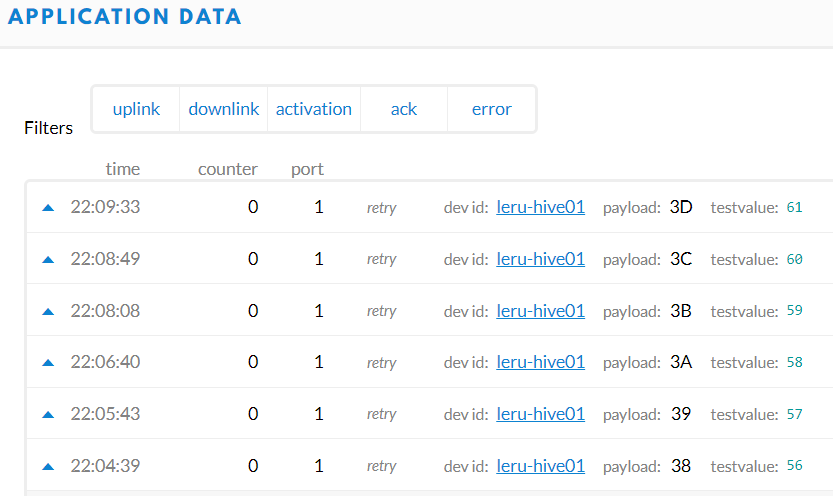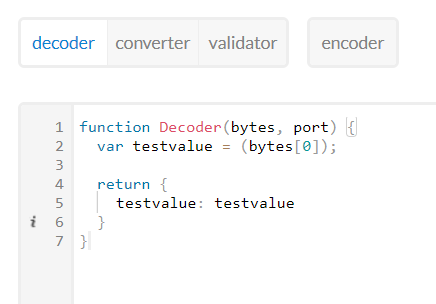I will really appreciate some ideas on what to do next. My setup is an Arduino Uno with a Dragino shield. When I send 1 byte from the Uno+Dragino then I receive 1 byte, when I send 2 bytes I receive 2 bytes in the test TTN Application. But my problem is that I can not work out the relation to what I send, and and what I then receive. What do I need to do to receive the actual value that I send?
For example:
Send value 0x05 = received payload: 3D, testvalue:61
Send value 0x04 = received payload: 3C, testvalue:60
Send value 0x03 = received payload: 3B, testvalue:59
Send value 0x02 = received payload: 3A, testvalue:58
Send value 0x01 = received payload: 39, testvalue:57
Send value 0x00 = received payload: 38, testvalue:56

Here is the Payload Formatting that I apply to get “testvalue” above:

Here is the modified LMIC example code that I run on the Uno + Dragino:
#include <lmic.h>
#include <hal/hal.h>
#include <SPI.h>
// LoRaWAN NwkSKey, network session key
//static const PROGMEM u1_t NWKSKEY[16] = { 0x05, 0x31, 0x4F, 0x8D, 0x53, 0xD3, 0x70, 0x75, 0xC9, 0x00, 0x1D, 0xD2, 0x5E, 0x56, 0xBB, 0xA0 };
static const PROGMEM u1_t NWKSKEY[16] = { 0x5B, 0xC5, 0xD6, 0x71, 0x2C, 0x00, 0xAC, 0xBC, 0x0A, 0x41, 0x9B, 0xAF, 0xC5, 0x58, 0x1E, 0x5E };
// LoRaWAN AppSKey, application session key
static const u1_t PROGMEM APPSKEY[16] = { 0x70, 0xB3, 0xD5, 0x7E, 0xD0, 0x01, 0x3D, 0x67 };
// LoRaWAN end-device address (DevAddr)
static const u4_t DEVADDR = 0x26062F90; // <-- Change this address for every node!
// These callbacks are only used in over-the-air activation, so they are left empty here (we cannot leave them out completely unless
// DISABLE_JOIN is set in config.h, otherwise the linker will complain).
void os_getArtEui (u1_t* buf) { }
void os_getDevEui (u1_t* buf) { }
void os_getDevKey (u1_t* buf) { }
byte myValue = 0x05;
static byte mydata[1] = { myValue};
static osjob_t sendjob;
// Schedule TX every this many seconds (might become longer due to duty
// cycle limitations).
const unsigned TX_INTERVAL = 60;
// Pin mapping (Dragino Shield)
const lmic_pinmap lmic_pins = {
.nss = 10,
.rxtx = LMIC_UNUSED_PIN,
.rst = 9,
.dio = {2, 6, 7},
};
void onEvent (ev_t ev) {
}
void do_send(osjob_t* j){
// Check if there is not a current TX/RX job running
if (LMIC.opmode & OP_TXRXPEND) {
Serial.println(F("OP_TXRXPEND, not sending"));
} else {
// Prepare upstream data transmission at the next possible time.
for (int i = 0; i < sizeof(mydata); i++) {
Serial.println(mydata[i]);
}
LMIC_setTxData2(1, mydata, sizeof(mydata), 0);
}
// Next TX is scheduled after TX_COMPLETE event.
}
void setup() {
Serial.begin(115200);
// #ifdef VCC_ENABLE
// // For Pinoccio Scout boards
// pinMode(VCC_ENABLE, OUTPUT);
// digitalWrite(VCC_ENABLE, HIGH);
// delay(1000);
// #endif
// LMIC init
os_init();
// Reset the MAC state. Session and pending data transfers will be discarded.
LMIC_reset();
// Set static session parameters. Instead of dynamically establishing a session
// by joining the network, precomputed session parameters are be provided.
#ifdef PROGMEM
// On AVR, these values are stored in flash and only copied to RAM
// once. Copy them to a temporary buffer here, LMIC_setSession will
// copy them into a buffer of its own again.
uint8_t appskey[sizeof(APPSKEY)];
uint8_t nwkskey[sizeof(NWKSKEY)];
memcpy_P(appskey, APPSKEY, sizeof(APPSKEY));
memcpy_P(nwkskey, NWKSKEY, sizeof(NWKSKEY));
LMIC_setSession (0x1, DEVADDR, nwkskey, appskey);
#else
// If not running an AVR with PROGMEM, just use the arrays directly
LMIC_setSession (0x1, DEVADDR, NWKSKEY, APPSKEY);
#endif
// Setup the TTN Channels for NZ
LMIC_selectChannels();
// Disable link check validation
LMIC_setLinkCheckMode(0);
// TTN uses SF9 for its RX2 window.
LMIC.dn2Dr = DR_SF9;
// Set data rate and transmit power for uplink (note: txpow seems to be ignored by the library)
LMIC_setDrTxpow(DR_SF7,14);
// Let LMIC offset for +/- 1% clock error
LMIC_setClockError(MAX_CLOCK_ERROR*10/100);
// Start job
do_send(&sendjob);
}
void loop() {
os_runloop_once();
}